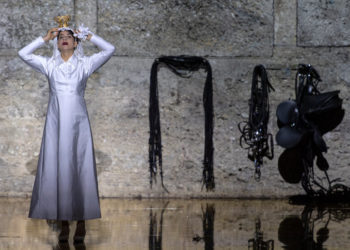Roving Eye is the Book Review’s essay series on international writers of the past whose works warrant a fresh look, often in light of reissued, updated or newly translated editions of their books.
The Italian writer Dino Buzzati (1906-72) sneaked up on me. I like to think of myself as a completist when it comes to the 20th century’s international masters of fantastical and surrealist literature, from Julio Cortázar to Kobo Abe to Anna Kavan, yet despite the acclaim from his publishers and translators, the endorsements from Borges and J.M. Coetzee, and a name that makes him sound like a glam-rock guitar hero, I’d missed Buzzati until now. (Completists rarely get there.)
I may not be alone in this. American literary culture often seems to make room for precisely one famous writer in a given language at a time — say, Luigi Pirandello, Alberto Moravia, Italo Calvino, Umberto Eco and Elena Ferrante, among Italians — while others, prominent in their native countries, never find a turn in the spotlight.
So much, of course, depends on publishing circumstance. Buzzati hasn’t been without advocates in the English language. His 1940 novel “Il Deserto dei Tartari,” translated into English by Stuart C. Hood and published as “The Tartar Steppe,” was reviewed in major publications and has remained in print in Britain. In the 1980s North Point Press presented handsome collections of his stories, selected and translated by Lawrence Venuti. Still, until recently, the view of Buzzati in English was a fragmented, almost teasing one.
The U.S. publication of Buzzati’s work is now in the deft hands of New York Review Books, which has corralled five titles for its Classics series. These include three novels — “The Singularity” (1960), “A Love Affair” (1963) and “The Tartar Steppe,” which was recently retranslated under the title “The Stronghold” — as well as “Poem Strip” (1969), a graphic novel that will be reissued in the fall.
Earlier this year, Venuti continued his curation of Buzzati’s short fiction with THE BEWITCHED BOURGEOIS: Fifty Stories (NYRB Classics, 328 pp., paperback, $19.95), a chronological survey culled from the hundreds of stories published in the author’s lifetime. Our view of him may still be partial: Buzzati’s life’s work includes children’s books, poetry, travel writing and journalism, and his jazzy drawings provide cover art for all five NYRB volumes. But these books form an extraordinary opportunity for Anglophone readers to take a leap into his unusual mind and have a look around.
Start with “The Stronghold.” That’s a recommendation. The story of an Italian Army officer who has been assigned to a mysterious mountain fortress at which nothing, precisely, ever occurs, Buzzati’s third novel is a book at once consummate — an unrepeatable performance — and typical of the tone and temper, the anxious, distractible mournfulness, of all of Buzzati’s subsequent work.
You may come across the U.K. edition, which still circulates widely in the Hood translation. This is fine, in the sense that we enjoy the coexistence of parallel translations of Proust and Kafka. In his afterword, Venuti praises Hood’s version. He then explains that his motive in retranslating the book was to restore some of the autobiographical, political and cultural context to a work that was taken, in Venuti’s words, “as an allegory or parable … with universal application,” or was “assimilated to existentialism.”
That is to say, Buzzati’s novel seemed, at the time of its first publication in Europe, of a piece with novels by Albert Camus, Jean-Paul Sartre and Kafka. Even after Venuti’s “historically oriented” re-territorialization, it still does. And, as a key inspiration for Coetzee’s “Waiting for the Barbarians,” it makes a bridge between those writers and the next generation. Yet Venuti subtly reinvigorates a specific context — the militarization and xenophobia of early-20th-century Italian political life — that could hardly be more timely.
One influence stands above and apart. Buzzati, who read German, was among Kafka’s first readers to produce a novel in the category of the “Kafkaesque.” Though we’re all tired of hearing that word thrown around merely to describe the confusing and bureaucratic, it remains the best term for the fictive mode that makes the author of “The Metamorphosis” and “The Trial” so singular, a mode characterized by a frieze-like atmosphere suggestive of allegory, yet resisting firm interpretation.
One measure of Kafka’s power is that his method is capacious enough for so many others to inhabit and make their own, and yet so specific that a clear tip of the cap is required. (Often this is acknowledged up front, in a book’s title.) Examples include Rex Warner’s “The Aerodrome,” Alan Sillitoe’s “The General,” J. Robert Lennon’s “Castle,” Jennifer Egan’s “The Keep” and Kazuo Ishiguro’s “The Unconsoled.” Buzzati’s tribute, which he initially titled “La Fortezza” (“The Fortress”), also happens to be — as in the cases of Warner and Ishiguro — its author’s greatest achievement.
Buzzati spent the majority of his life working as a journalist at Corriere della Sera, one of Italy’s oldest and most prominent newspapers. Its pages became an outlet for many of his fantastical and ominous tales; Venuti’s selection from among these make up “The Bewitched Bourgeois.”
The best of Buzzati’s early stories place him in the company of Cortázar, Kavan, Robert Coover, Paul Bowles and Haruki Murakami, as well as Buzzati’s own countryman and admirer, Calvino, those global masters of fable and enigma who collectively built on Kafka’s example. In “Seven Floors,” “The Shadow of the South,” “The Seven Messengers,” the title story and the novella-length “Panic at La Scala,” Buzzati creates surrealist moods, as well as inversions and conflations of space and time, to rival a Buñuel film or a de Chirico painting. Elsewhere, Buzzati’s fascination with doppelgängers and the paradoxes of authorship will remind many readers of Poe or Borges.
Unfortunately, as his role at the newspaper grew more regular and secure, the later tales often become riffs rather than fully dimensional stories. Buzzati plays the role of a raconteur, yet he’s a Rod Serling without actors or a sound stage to embody his “Twilight Zone” premises. Many of these pieces employ direct address, bringing to the foreground Buzzati’s unusual voice, one marked by insolence punctuated with reservations, and showing a permanent insecurity about his work’s value and his invisible reader’s expectations. (Within these pieces lies the evidence of how he fussed over the implication that he was Kafka’s follower.) The results, in the last hundred pages of “The Bewitched Bourgeois,” are too often either flippant or ponderous.
This Buzzatian proclivity for hesitation, insecurity and shame at a failure to live up to some unspecified challenge or opportunity — the cultural critic Katy Waldman calls him “the bard of nervousness” — aligns the Buzzati we come to know from the newspaper stories with the self-doubting protagonists in the three novels available in English. Of the two besides “The Stronghold,” “The Singularity” is a delight; the other, “A Love Affair,” a bummer.
The short novel “The Singularity” is science fiction, full stop, but European-style: The book, about a woman who is uploaded into a vast machine but subverts its programming to seek emotional and sexual connection, finds a sweet spot between Stanislaw Lem’s “Solaris” and Calvino’s “Cosmicomics.” The gender dynamics may be very 20th-century (as they are in Lem and Calvino) but are worth remitting in exchange for what remains both amusing and prescient in the tale.
Not so much with “A Love Affair.” The story here is told from the point of view of Antonio Dorigo, a middle-aged, moderately successful architect and a man of fine sensibility who feels he might have reached for greater achievement. He becomes involved with a young and beautiful prostitute who may or may not ever, even slightly, reciprocate his feelings; things go badly.
Dorigo’s outward behavior, blending hesitation and impulsiveness, and his inner monologues, full of paranoid self-undermining and doomy self-reproach, both suggest an older version of the young military aspirant in “The Stronghold,” as well as the aging newspaperman Buzzati, in the form he reveals in his stories of the same period. Dorigo will also remind readers of Humbert Humbert from Vladimir Nabokov’s “Lolita” (1955), which in both scandal and acclaim had shaken the literary universe at the time. (Joseph Green’s translation of “The Stronghold,” from 1964, adopts Nabokov’s coinage “nymphet,” though Green spells it “nymphette.”)
The comparison isn’t a good one for Buzzati. While “Lolita” dazzles us by undermining any interpretive certainties — Humbert confesses both his criminality and obtuseness between the lines of his brazen self-justification — “A Love Affair” reproduces the terms but eschews Nabokov’s hall-of-mirrors unreliability. As Buzzati’s account grinds on, it becomes a vehicle bearing such a freight of arrogant self-pity, class snobbery and distaste for the vitality of the young woman, that it meanders into a ditch from which it can never recover. We still read many misogynistic books, but less often revive the failed ones.
If Venuti may have slightly overexposed Buzzati by collecting too many of the late tales — a “Forty Stories” might have better persuaded me — is it possible that NYRB Classics has done something similar by rounding up this late novel? Curation is a tricky game. As I said at the start, I’m often a completist, seeking out every possible book when I discover a new writer I love. This approach sometimes creates dilemmas, and there’s no good solution here except to point a big blinking neon arrow to the masterworks, which for me are “The Stronghold” and a goodly number of Buzzati’s stories from the 1930s to the ’50s, with “The Singularity” along for the ride.
Masterworks are hard to deliver. For Buzzati, having delivered a few, it seems they alone may have been hard to live with. I’m as sorry to think that as I am glad to know that he lived and that his books exist.
The post A Master of Surrealist Fiction and a Bard for Anxious Times appeared first on New York Times.




